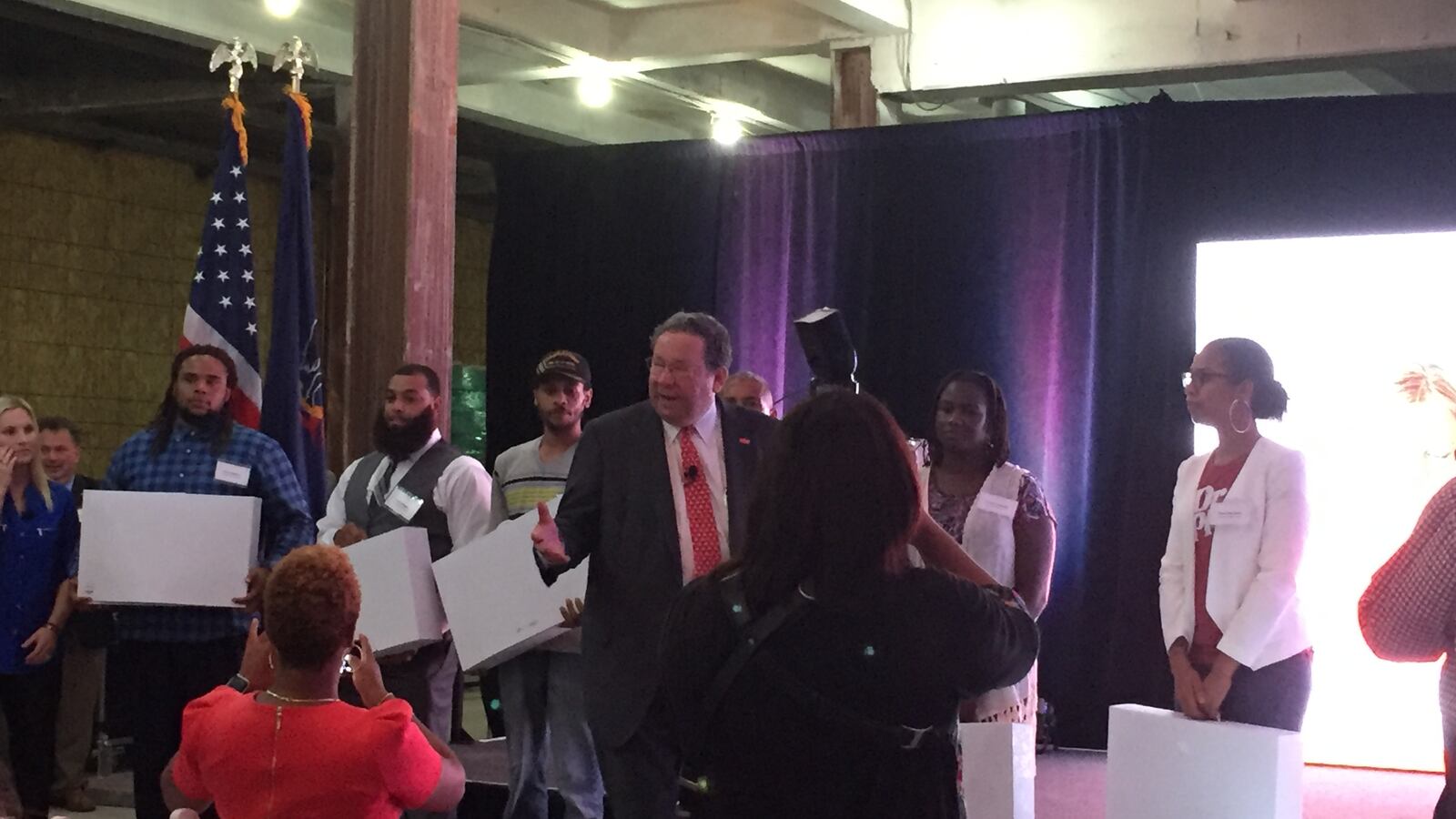This article was originally published in The Notebook. In August 2020, The Notebook became Chalkbeat Philadelphia.
Comcast official David L. Cohen, speaking to a room full of military veterans, politicians, and his company’s personnel, detailed the expansions being made to Comcast’s program that offers internet access to low-income people.
The program, called Internet Essentials, now will include all low-income veterans, 36,000 of whom live in Pennsylvania. Previously, the program was restricted to households that include children eligible for the National School Lunch Program or that receive federal housing assistance.
The company said Monday it had added nearly 20,000 low-income Philadelphia households and 2 million households nationally over the last year.
Helping to promote the expansion were Jocelyne and Monique Lamoureux-Morando, twin sisters and gold medalists from the 2018 U.S. women’s ice hockey team. They are the latest athletes to sign on as official spokespeople for Internet Essentials to help expand awareness of the program.
Jocelyne stressed that low-income households in both urban and rural areas have an issue with obtaining internet access. The twins are from North Dakota.
“Almost all of North Dakota is wired for broadband, so we do see similar issues in our state that Philadelphia and the rest of the country face with internet access,” Jocelyne said. “Just like Philadelphia, North Dakota faces the digital divide.”
A third of lower-income households in North Dakota don’t have online access; the figure for Pennsylvania is 40 percent.
Monique pointed out how important the internet is to everyone from students doing homework to parents entering the workforce.
“How can you possibly expect kids and teenagers … [to] do their homework properly if you don’t have access to internet?” Monique said. “I think the same goes for parents who are applying for jobs and trying to access health care: You don’t have access to internet on a daily basis, you can’t do those things effectively.”
The program has operated since 2011 and has provided 113,000 households with low-cost internet access in Pennsylvania, according to Comcast.
It has been more successful in providing internet access than many other similar programs, said Cohen, Comcast’s senior executive vice president and chief diversity officer.
“Seven years into the program and Internet Essentials is by far the most successful broadband adoption program,” Cohen said. “In fact, if you take publicly supported statistics of every other private broadband adoption in the country over the last seven years, Internet Essentials has connected more than 10 times as many low-income Americans to the internet as all the rest of those programs combined.”
The program provides eligible households with speeds of up to 15 megabits per second (Mbps) at $9.95, plus tax, a month. The 15 Mbps speed is advertised as both high speed and part of the broadband adoption network.
The Federal Communications Commission voted in 2015 to change its definition of what constitutes high-speed broadband internet from 4 Mbps to 25 Mbps.
Of Internet Essentials being marketed as high-speed broadband, Jennifer Bilotta, vice president of communications at Comcast, said: “There’s nothing you can’t do online with 15 Mbps download speeds.”
The program is trying to address the divide in internet access between middle-income and low-income households. Of households making at least $75,000, 95 percent have access to broadband vs. 60 percent of households making less than $35,000.
At the event, Mayor Kenney spoke about the importance of the program and how it has helped veterans. He commended Comcast for providing the internet to four million people nationwide, which Cohen later said was actually six million.
“I have to apologize to the mayor because he was working off of our last-year number of four million low-income Americans connected to the internet,” Cohen said. “In the last year, we’ve actually added two million more people to the internet.”
He said that amounts to 1.5 million households, with most of the people able to go online “for the first time in their lives.” Of the six million, 460,000 are in Pennsylvania.
Also at the event, Cohen announced an accelerator grant for the Veterans Multi-Service Center, which will be used to build a computer lab in the building where the announcement was made – 700 N. Somerset St. That building, known as Edison 64, is currently under renovation; it will be a housing community for veterans in the area with on-site services.
Comcast will also be donating 25 laptops to the VMC for its women’s veterans center. The Lamoureux-Morando sisters handed out six laptops to six VMC veterans who were present, along with free Internet Essentials access for the next six months.
Edison 64 and the VMC are on the site of the original Thomas A. Edison High School, which lost 64 graduates in the Vietnam War – the highest total of any single high school in the country.

